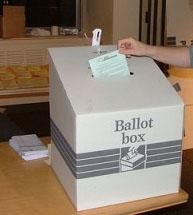2014: Foreshadowing the Future of American Voting

by: Joshua Bryant
What is one of the significant takeaways from the 2014 election? The traditional way Americans vote is changing. Voting has traditionally been the Tuesday after the first Monday in November, during specific times set by state legislatures. Why? Because in 1845, when Congress picked this date, Tuesday did not conflict with Sunday Church services and by November most of the harvest was over.
Today, however, the majority of Americans are not farmers, and it no longer requires an overnight horse and buggy trip to travel to a polling place. Recognizing changing demographics, states across the nation have begun to expand their voting periods. Currently thirty-three states and the District of Columbia allow people to vote in person prior to Election Day. This election cycle, Missouri proposed an amendment to its constitution that could allow voters to cast their ballots in person or by mail for six business days if the legislature and the governor provide the necessary funds.
In addition, online voting and registration has become more prevalent. According to an Op-Ed in the USA Today “31 states will allow over 3 million voters to cast ballots over the Internet in this election.” This is an option that is limited to military and overseas voters in most states, but Alaska is now permitting all of their voters to vote online.
These new measures are meant to expand voting, but they have run into some roadblocks. A critique of early and longer voting periods is that they increase the already high cost of political campaigns. Another criticism is that, historically, increasing the opportunity to vote has not necessarily increased voter turnout and participation.
The newer territory of online voting also presents unique challenges. Keeping these votes secure and trustworthy is a big concern, but technical issues could also prove to be a stumbling block. For example, in this election cycle Texas, Georgia, and Colorado all experienced major technical issues in their online registration systems.
These changes to the traditional way we vote could increase turnout and make it easier for people to vote. However, there are still many kinks to work out, and in the end only time will tell if these expansions will expand voting to more voters.
